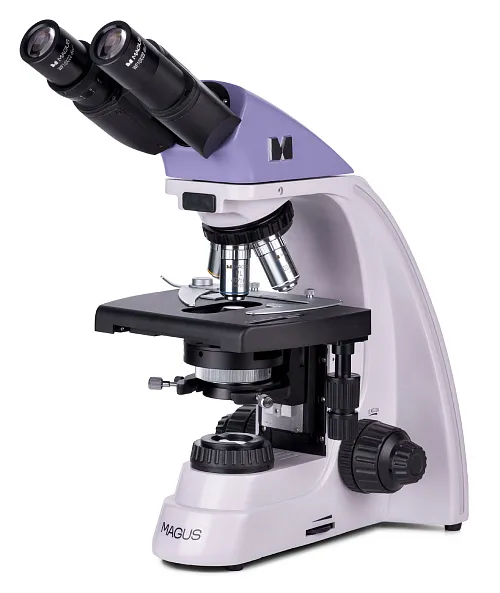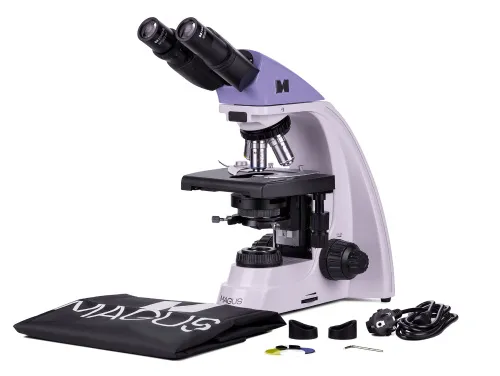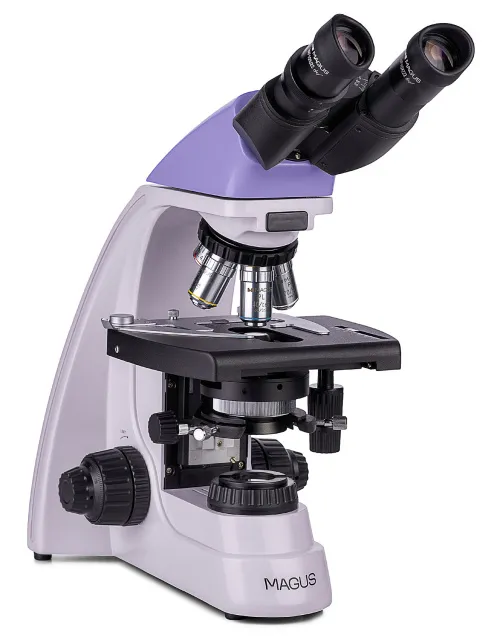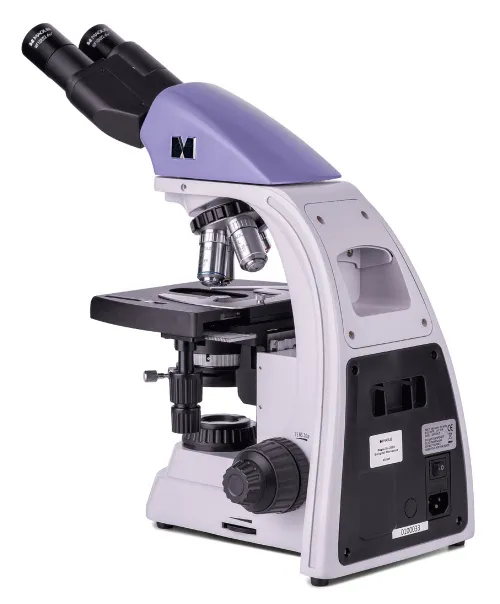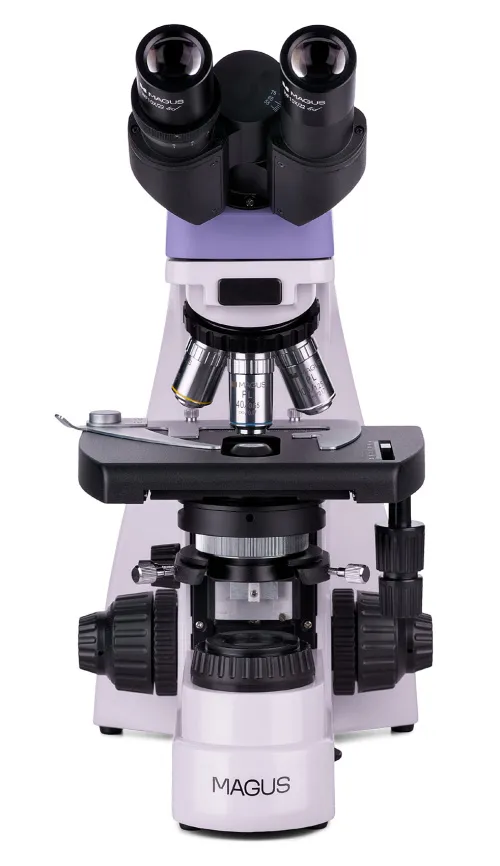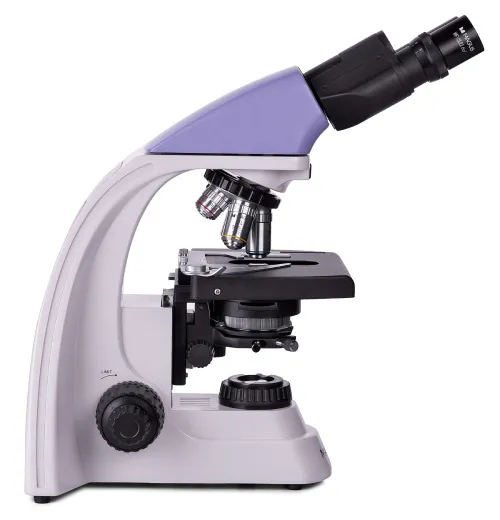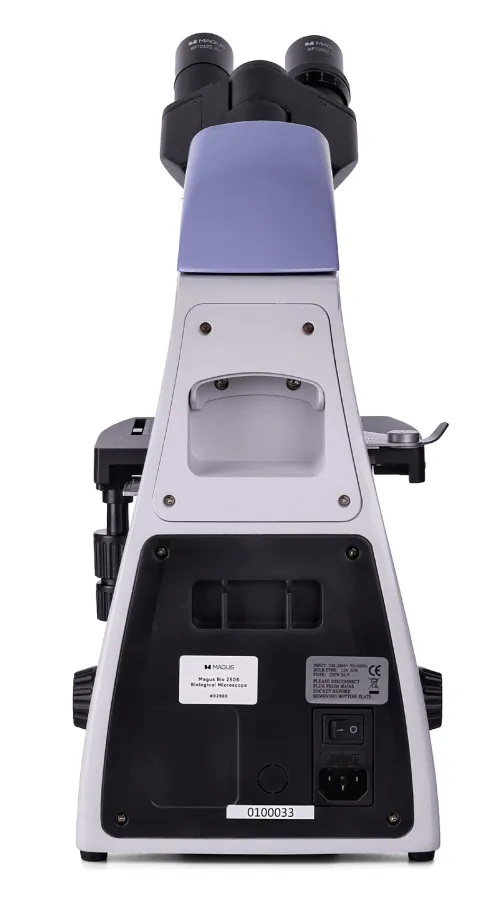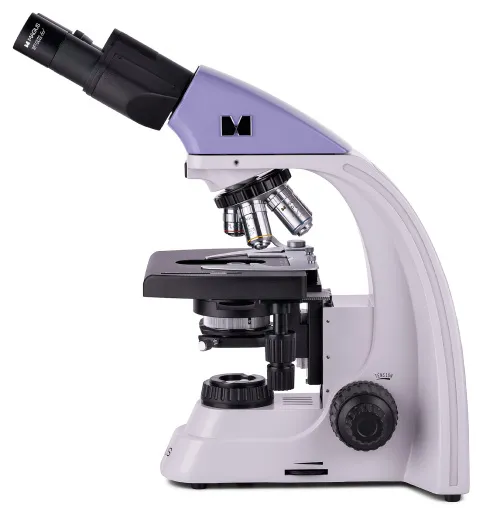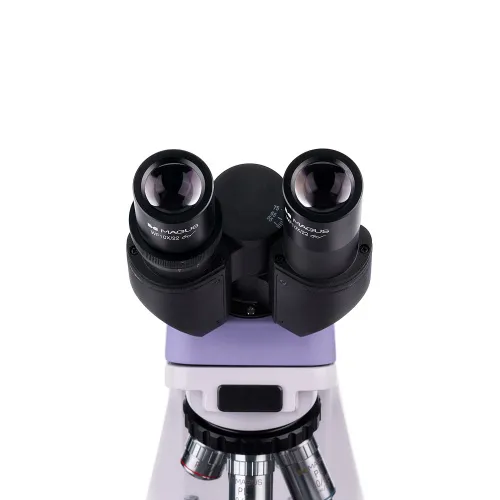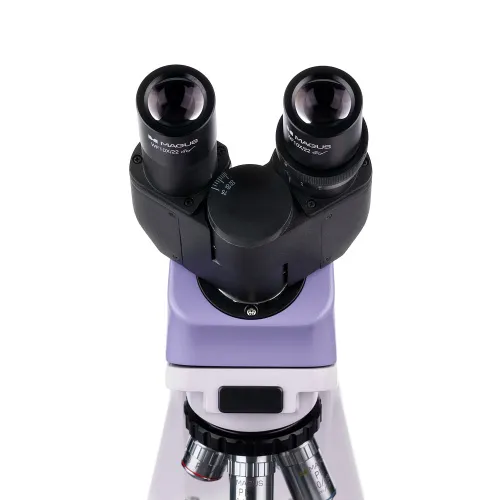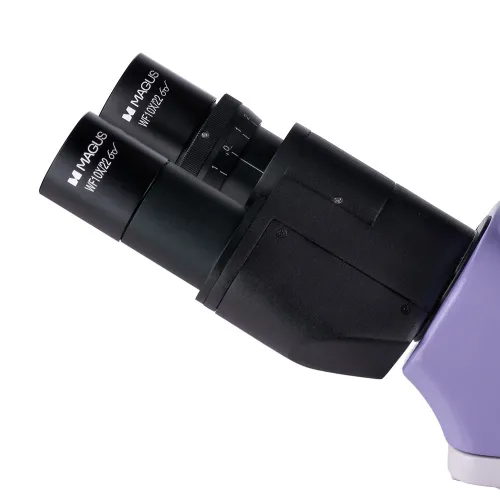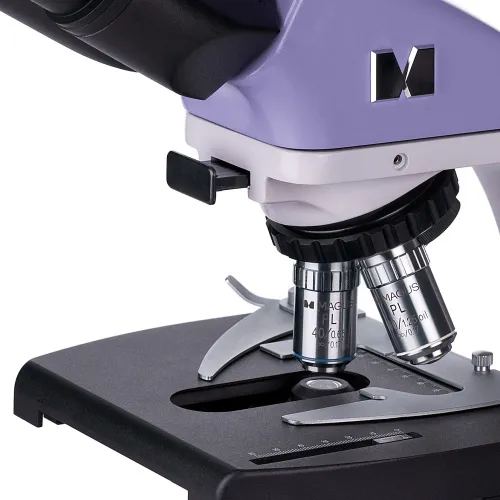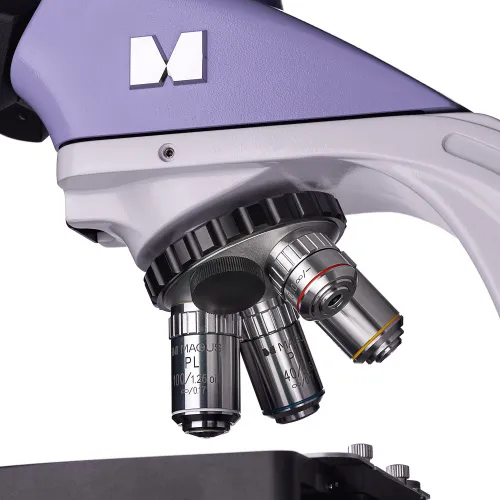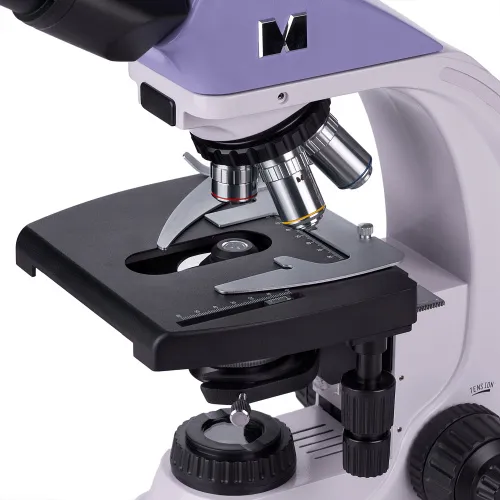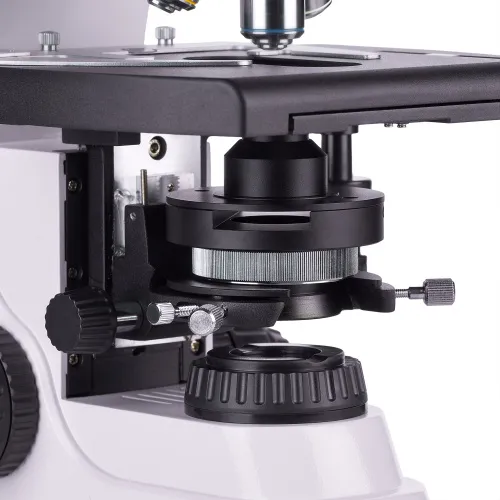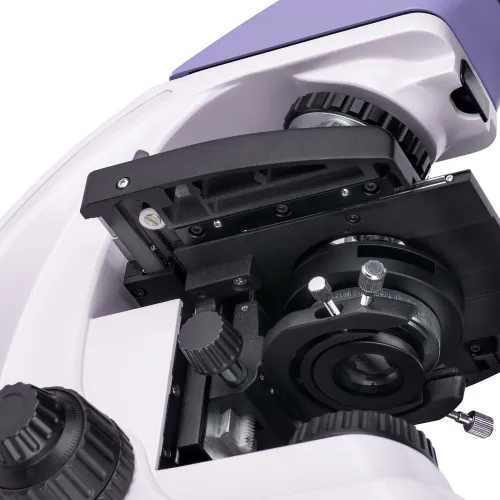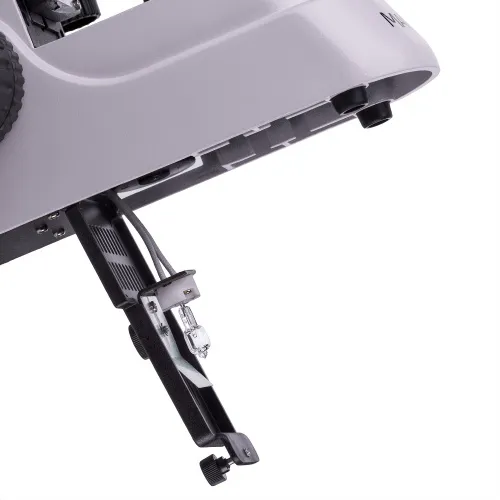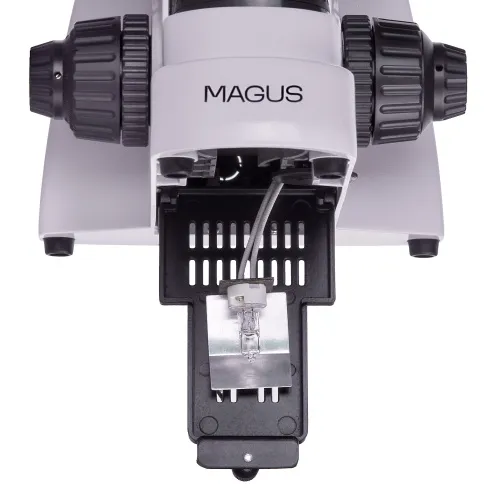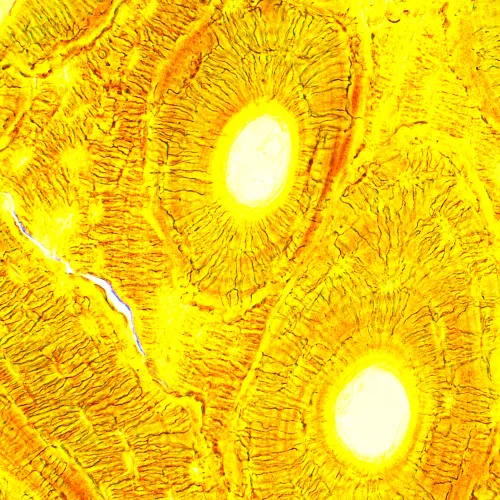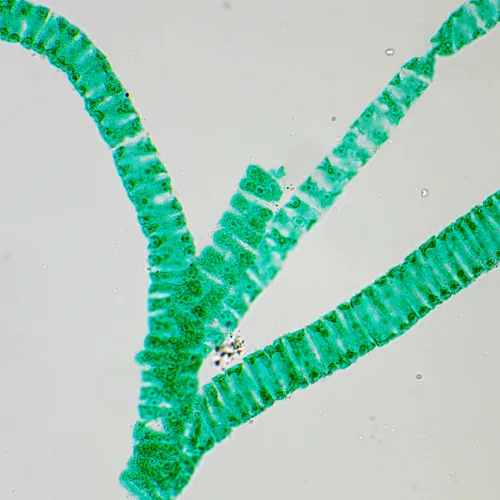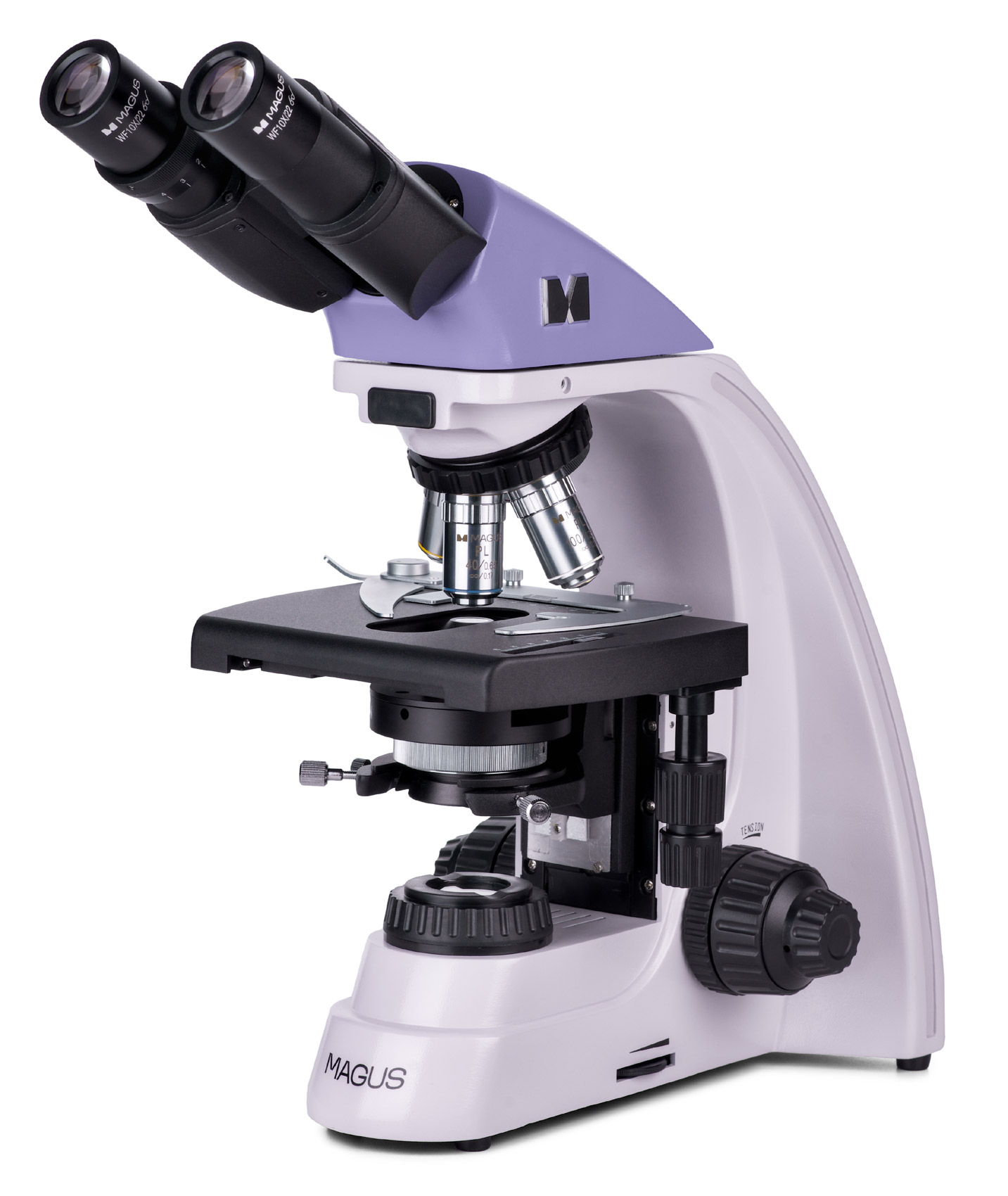MAGUS Bio 250B Biological Microscope
Magnification: 40–1000x. Binocular head, infinity plan achromatic objectives, 30W halogen bulb
| Product ID | 82888 |
| Brand | MAGUS |
| Warranty | 5 years |
| EAN | 5905555018003 |
| Package size (LxWxH) | 43x27x63 cm |
| Shipping Weight | 10 kg |
MAGUS Bio 250B biological microscope is an optical instrument used for studying thin transparent and translucent objects. Brightfield microscopy in transmitted light is the main microscopy technique. The microscope can be equipped with additional accessories for using darkfield, phase contrast, and polarization techniques. High-quality optics with additional options to expand its capabilities, easy-to-use mechanics, and smart design make this microscope an excellent choice for lab work, research, and teaching.
Optics
The binocular head allows you to mount a digital camera in one of the eyepiece tubes (camera not included). The tubes can be rotated 360° to obtain a comfortable position to fit the height of the observer. The diopter adjustment ring is located on the left tube.
The revolving nosepiece allows for mounting 5 objectives. The microscope comes with infinity plan achromatic objectives that provide clear, high-contrast images across the entire field of view. There is a single free slot in the revolving nosepiece for mounting an additional objective. The revolving nosepiece with objectives is oriented toward the interior so that the user can see the objectives inserted into the optical path, and the space above the stage is free.
The microscope optics in the basic configuration provides magnification from 40 to 1000x. The use of additional eyepieces, if necessary, allows you to increase the upper limit of the magnification range.
Illumination
Light source: 30W halogen bulb. It provides uniform and bright illumination of the sample using any objective lens and any observation method, including darkfield and phase contrast techniques. The warm spectrum of light is pleasing and comfortable for the eyes, so they will not get tired even when working with the microscope for long periods of time.
The Abbe condenser has a slot for mounting a darkfield or phase slider. The condenser design simplifies and speeds up the process of switching research techniques. The condenser is height-adjustable and can be centered. The field diaphragm makes it possible to set up the Köhler illumination.
Stage and focusing mechanism
The stage is equipped with a mechanical attachment that can be removed for manual scanning. There is no positioning rack that ensures the ergonomic operation of the stage.
Focus adjustment is adjusted by the coaxial coarse and fine focusing knobs on both sides of the microscope body. The mechanism is smooth and precise, and no effort is required to rotate the knobs. The coarse focusing has a lock knob and tension adjustment. The focusing knobs are located at the bottom. Therefore, you can rest your hands on the table rather than holding your arms in the air. It increases comfort during long work sessions.
Accessories
A wide range of accessories allows the MAGUS Bio 250B to be configured in the most convenient way for the user. Eyepieces, lenses, darkfield, phase contrast and polarization devices, calibration slides, and digital cameras are available.
Key features:
- Infinity plan achromatic objectives
- Binocular head with an option of mounting a digital camera in one of the eyepiece tubes, diopter adjustment on the left tube
- The height of the binocular head can be adjusted by rotating the eyepiece tubes 360°
- Coaxial coarse & fine focusing knobs, coarse focusing tension adjusting knob, coarse focusing lock knob
- Field diaphragm for setting up the Köhler illumination
- Slot in condenser for installing a slider: darkfield or phase slider
- 30W halogen lamp for working in transmitted light
- Option to install additional accessories
The kit includes:
- Base with a power input, transmitted light source, focusing mechanism, stage, condenser mount, and revolving nosepiece
- Abbe condenser
- Binocular head
- Infinity plan achromatic objective: 4x/0.10
- Infinity plan achromatic objective: 10x/0.25
- Infinity plan achromatic objective: 40x/0.65 (spring-loaded)
- Infinity plan achromatic objective: 100x/1.25 oil (spring-loaded)
- Eyepiece 10x/22mm with a long eye relief (2 pcs.)
- Eyecup (2 pcs.)
- Filter (4 pcs.)
- Bottle of the immersion oil
- AC power cord
- Dust cover
- User manual and warranty card
Available on request:
- 10x/22mm eyepiece with scale
- 12.5x/14mm eyepiece (2 pcs.)
- 15x/15mm eyepiece (2 pcs.)
- 20x/12mm eyepiece (2 pcs.)
- 25x/9mm eyepiece (2 pcs.)
- Infinity plan achromatic objective: 20x/0.40
- Infinity plan achromatic objective: 60x/0.80 (spring-loaded)
- Phase-contrast device
- Phase slider
- Darkfield condenser NA 0.9
- Oil darkfield condenser NA 1.36–1.25
- Darkfield slider
- Polarization devices
- Digital camera
- Calibration slide
- C-mount adapter
- Adapter ring
- LCD Monitor
| Product ID | 82888 |
| Brand | MAGUS |
| Warranty | 5 years |
| EAN | 5905555018003 |
| Package size (LxWxH) | 43x27x63 cm |
| Shipping Weight | 10 kg |
| Type | biological, light/optical |
| Microscope head type | binocular |
| Head | Gemel head (Siedentopf, 360° rotation) |
| Head inclination angle | 30 ° |
| Magnification, x | 40 — 1000 |
| Magnification, x (optional) | 40–1200/1250/1500/1600/2000/2500 |
| Eyepiece tube diameter, mm | 30 |
| Eyepieces | 10х/22mm, eye relief: 10mm (*optional: 10x/22mm with scale, 12.5x/14; 15x/15; 20x/12; 25x/9) |
| Objectives | infinity plan achromatic: 4x/0.10; 10x/0.25; 40xs/0.65; 100xs/1.25 (oil); parfocal distance: 45mm (*optional: 20x/0.40; 60хs/0.80) |
| Revolving nosepiece | for 5 objectives |
| Working distance, mm | 21 (4x); 5 (10x); 0.66 (40xs); 0.36 (100xs); 8.8 (20x); 0.465 (60xs) |
| Interpupillary distance, mm | 48 — 75 |
| Stage, mm | 180x150 |
| Stage moving range, mm | 75/50 |
| Stage features | two-axis mechanical stage, without a positioning rack |
| Eyepiece diopter adjustment, diopters | ±5 (on the left tube) |
| Condenser | Abbe condenser, N.A. 1.25, center-adjustable, height-adjustable, adjustable aperture diaphragm, a slot for a darkfield slider and phase contrast slider, dovetail mount |
| Diaphragm | adjustable aperture diaphragm, adjustable iris field diaphragm |
| Focus | coaxial, coarse focusing (21mm, 39.8mm/circle, with a lock knob and tension adjusting knob) and fine focusing (0.002mm) |
| Illumination | halogen |
| Brightness adjustment | ✓ |
| Power supply | 220±22V, 50Hz, AC network |
| Light source type | 12V/30W halogen bulb, G4 |
| Light filters | yes |
| Operating temperature range, °C | 5...+35 |
| Ability to connect additional equipment | phase contrast device (condenser and objectives), darkfield condenser (dry or oil), polarization devices (polarizer and analyzer) |
| User level | experienced users, professionals |
| Assembly and installation difficulty level | complicated |
| Application | laboratory/medical |
| Illumination location | lower |
| Research method | bright field |
| Pouch/case/bag in set | dust cover |
| Weight, kg | 8 |
| Dimensions, mm | 200x436x400 |
We have gathered answers to the most frequently asked questions to help you sort things out
Find out why studying eyes under a microscope is entertaining; how insects’ and arachnids’ eyes differ and what the best way is to observe such an interesting specimen
Read this review to learn how to observe human hair, what different hair looks like under a microscope and what magnification is required for observations
Learn what a numerical aperture is and how to choose a suitable objective lens for your microscope here
Learn what a spider looks like under microscope, when the best time is to take photos of it, how to study it properly at magnification and more interesting facts about observing insects and arachnids
This review for beginner explorers of the micro world introduces you to the optical, illuminating and mechanical parts of a microscope and their functions
Short article about Paramecium caudatum - a microorganism that is interesting to observe through any microscope

